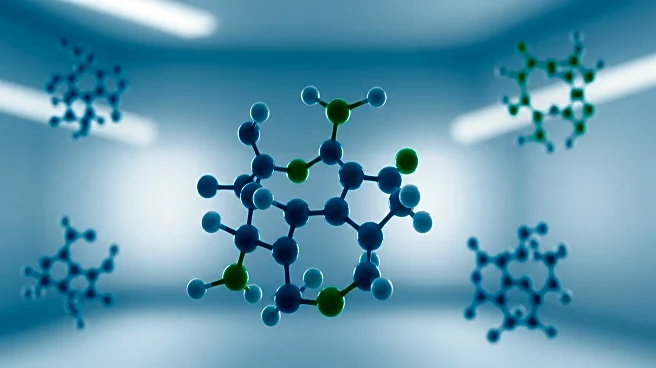What's Happening?
A recent study has demonstrated the effectiveness of quaternized chitosan derivatives in inhibiting the growth and biofilm formation of Staphylococcus aureus, including methicillin-resistant strains (MRSA). The research involved synthesizing hydrophobically modified quaternized chitosan derivatives and testing their antibacterial properties against various strains of S. aureus. The study found that these derivatives significantly enhance antibacterial and antibiofilm properties, offering a promising strategy for infection prevention. The derivatives were synthesized by reacting chitosan with alkyl iodides, resulting in compounds that disrupt bacterial growth and biofilm formation.
Why It's Important?
The findings have significant implications for healthcare, particularly in the fight against antibiotic-resistant bacteria like MRSA. By providing an alternative method to combat bacterial infections, quaternized chitosan derivatives could reduce reliance on traditional antibiotics and help mitigate the growing issue of antibiotic resistance. This research could lead to the development of new antimicrobial coatings for medical devices and surfaces, improving infection control in healthcare settings. The potential applications extend to various industries, including pharmaceuticals and biotechnology, where effective antibacterial agents are crucial.
What's Next?
Further studies are likely to focus on optimizing the synthesis and application of quaternized chitosan derivatives in real-world settings. Researchers may explore the integration of these compounds into medical devices and coatings, assessing their long-term efficacy and safety. Collaboration between academic institutions and industry partners could accelerate the development of commercial products based on this technology. Regulatory bodies may also begin evaluating the safety and effectiveness of these derivatives for widespread use.
Beyond the Headlines
The study highlights the potential for chitosan derivatives to address broader public health challenges, such as hospital-acquired infections. Ethical considerations may arise regarding the use of synthetic compounds in healthcare, prompting discussions on balancing innovation with safety. Additionally, the environmental impact of producing and disposing of these compounds may warrant further investigation.









